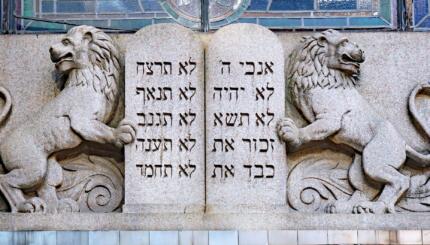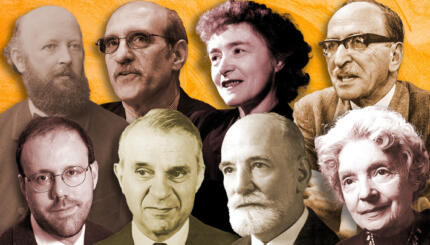In the following article, the author details her personal experiences as a single Jewish woman who adopted a daughter from China and has endeavored to raise her with pride in her Chinese and Jewish heritages. Reprinted with permission from JewishFamily.com.
Although I didn’t realize it at the time, my daughter’s integration into Jewish life began before she was even born or chosen for me. My father, adhering to Jewish tradition, asked me to name her after his parents. I had already decided to name her Zoë, as it meant “life.” To honor my father’s  request, I chose the Hebrew names Meira Sigal, meaning “shining treasure,” after my grandparents Morris and Mildred Sarah Kress.
request, I chose the Hebrew names Meira Sigal, meaning “shining treasure,” after my grandparents Morris and Mildred Sarah Kress.
I also wanted to honor my daughter’s heritage and history by giving her a Chinese name. When I adopted Zoë in May of 1994, adoptive parents were notified that there was a baby waiting for them, but received no other identifying information. I knew I was going to be a mom, period.
Meeting in China…and Sinai
I first met my daughter via a little piece of rice paper that was put at my place in a hotel restaurant in Nanchang, China. It listed her name–Fu Mian, her birthdate, and the date of her abandonment. Her first name meant “one who studies hard.” The FuZhou (now Linchuan) Social Welfare House gave every child they processed the last name of Fu, which means “lucky” or “prosperous.” As I stared at that little piece of paper, her name formed in my mind: Zoë FuMian Suni. I borrowed the Suni from another family in our adoption travel group because it meant “long-awaited little darling.” Chinese tradition values meaningful names, and Zoë has been given her share.
With your help, My Jewish Learning can provide endless opportunities for learning, connection and discovery.
Zoë was converted to Judaism in an Orthodox ceremony on her first birthday. I chose an Orthodox conversion because I didn’t want her “Jewishness” to be questioned as she grew into adulthood. My father, wearing a T-shirt emblazoned with the Great Wall of China, carried her into the mikveh, or ritual bath, and dunked Zoë the requisite three times. A trio of rabbis joyfully proclaimed her to be a Jew. It was an incredible experience to see my beautiful daughter become Jewish from my father’s hands. It was as if her new religion was passed down from her ancestors.
Our daily life is filled with references to Zoë’s Chinese heritage. Her room is decorated with Chinese arts and crafts. Our home is furnished with Chinese antiques and artwork that I purchased before the idea of a Chinese adoption became a reality. I want Zoë to be proud of her dual heritage, to appreciate the history and craftsmanship that went in to making these things. I want both her Chinese and Jewish sides to feel natural and right to her, parts of what make her a whole person. I also want her to know and understand that I, too, celebrate her diversity and feel it is a natural part of who she is and what makes up our family.
We celebrate Chinese festivals as they come up. I like to draw parallels between Judaism and Chinese and American cultural celebrations, such as the harvest festivals of Sukkot, Thanksgiving, and Mid-Autumn Festival. Zoë is growing up in America. She is learning to speak for herself and base her opinions on what she is learning about American life. The fact that she can celebrate the New Year three times–American, Jewish, and Chinese–is fascinating to her. Showing Zoë the parallels of different cultures and how we are all intertwined is very rewarding.
I have made sure that Zoë has ample opportunity to meet and befriend other Chinese. We have numerous Chinese friends and we are members of a Chinese adoption group. Zoë practices her developing knowledge of Mandarin with our Chinese friends and any other Asian that crosses her path. We also participate in our local Stars of David chapter, of which I am the coordinator. Zoë has many occasions to befriend other multinational adopted children and see how their lives fit into the spectrum of being Jewish.
We eat ethnic food in our house all the time. It is fun for me to point out to Zoë the similarities between Jewish and Chinese foods. Think of dumplings and kreplach, for instance. And what about those old standbys–chicken soup and wonton soup?…
Jewish & Chinese
It has been fascinating to watch Zoë explain being Jewish to our 18-year-old Chinese exchange student. Zoë has shown her how to light the candles on Shabbat, how to celebrate Jewish holidays like Hanukkah and Purim, and has explained what foods to eat and not eat on Passover. My little 6-year-old sees her “Jewish/Chineseness” as her badge of honor.
I understand some parents believe that immersion into Chinese culture–by attending Chinese school and learning Mandarin language–is necessary. I, however, believe that my duty to Zoë is to raise her in a loving home and instill pride in who and what she is. I believe that it is more important to bring our two cultures together as a natural adjunct to each other. I was raised in a Jewish home. Jewish is who I am and what I know. I am sending Zoë to a Jewish day school so that she will have a firm foundation in her Jewishness. This, I feel, will center her and enable her to meet life’s challenges head on. I hope that at the age of bat mitzvah, when she must reaffirm her life as a Jew, she will choose this path that I have shown her with love.
I want Zoë to have love and respect for both her heritages–the Chinese one she was born with and the Jewish one I gave her. No matter how much Chinese culture I show her, I cannot give her the experience of being raised in China by Chinese parents. She lives in America, as a Jewish child with a Chinese heritage. I cannot give her back what was taken from her in my quest to become a parent. I can only hope that my love of her differences will give her the pride in herself as a Chinese American Jew.


